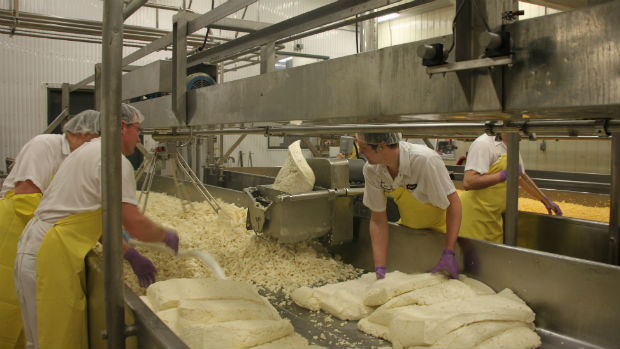Order Cheese for Sale Online Melbourne's Trusted Cheese Makers
Order Cheese for Sale Online Melbourne's Trusted Cheese Makers
Blog Article
An Extensive Consider Cheese Production: Components, Approaches, and the Future of Artisan Cheeses
The detailed process of cheese production is a fascinating merging of art and scientific research, where high-grade milk, rennet, and certain microbial cultures offer as foundational elements. As the market increasingly focuses on sustainability and transparency, the future of artisan cheeses assures to show both heritage and development.
Trick Components in Cheese Production
A variety of important active ingredients play a pivotal duty in cheese production, each adding to the end product's taste, appearance, and personality. The key component in cheese is milk, which can come from numerous resources, including cows, goats, and lamb - cheese makers melbourne. The sort of milk made use of substantially influences the cheese's preference and consistency; for instance, cow's milk commonly yields creamier cheeses, while goat's milk usually produces tasty selections
One more essential ingredient is rennet, an enzyme made use of to curdle the milk, dividing it right into curds and whey. The resource of rennet can be animal, veggie, or microbial, each imparting distinctive characteristics to the cheese.
Salt not only improves the taste however additionally functions as a chemical, hindering the growth of unwanted bacteria. Furthermore, various flavoring agents, such as natural herbs, spices, and even smoked wood, can be included in produce one-of-a-kind artisanal cheeses. Together, these ingredients create the foundation of cheese production, establishing the phase for varied and abundant cheese ranges.
Standard Cheese-Making Strategies
Utilizing typical cheese-making strategies, artisans all over the world protect time-honored approaches that have actually been given via generations. These techniques often stress making use of premium, locally sourced milk, which is central to the distinct tastes and textures of artisanal cheeses. The process normally begins with the careful home heating of milk, complied with by the enhancement of societies and rennet to promote coagulation.
Once the curds form, they are cut, allowing whey to drain pipes, a crucial step that affects moisture material and texture. The curds are after that gently mixed and prepared to achieve the wanted firmness. Afterward, they are drained pipes and pushed into mold and mildews. Salting is a vital aspect of this procedure, enhancing flavor while also working as a chemical.
Aging, or affinage, is one more important component, during which cheeses develop their characteristic fragrances and tastes. Artisans might utilize certain maturing atmospheres, utilizing humidity and temperature level controls to improve celebrity's profile. The dedication to these conventional methods not just supports neighborhood economies yet additionally contributes to the abundant variety of cheese varieties discovered worldwide, commemorating cultural heritage and artisanal workmanship.
Modern Developments in Cheese Manufacturing
Exactly how have technological advancements transformed cheese production in recent years? The assimilation of modern innovation has actually transformed both the efficiency and high quality of cheese production.
Furthermore, developments in microbiology have allowed cheesemakers to select details bacterial societies and enzymes, enhancing taste profiles and enhancing service life. Using sensor modern technology for checking fermentation problems has actually likewise become widespread, permitting real-time adjustments to maintain optimal environments for cheese aging.

These improvements not just improve the top quality and sustainability of cheese manufacturing yet additionally empower artisan manufacturers to preserve conventional tastes while embracing contemporary effectiveness. As modern technology continues to develop, the future of cheese manufacturing looks promising, mixing custom with development.
The Role of Terroir in Cheese
In the realm of cheese manufacturing, terroir plays a pivotal function in specifying the distinctive features of numerous cheeses. Terroir, a French term traditionally connected with a glass of wine, includes the environmental variables that affect agricultural items, consisting of soil make-up, climate, and neighborhood vegetation and animals. In cheese-making, the special characteristics of the region where the milk is sourced can impart details tastes and appearances to the final product.
As an example, the grazing conditions of dairy pets considerably influence the milk's composition, influenced by the types of grasses and natural herbs readily available in a particular locale. This differs not only in between nations however likewise in between regions within the exact same nation. Furthermore, the microbial neighborhoods present in the setting add to the his response fermentation procedures, leading to diverse profiles in taste and fragrance.
Cheeses such as Roquefort, Parmigiano-Reggiano, and Cheddar exhibit exactly how terroir can shape their identifications, making them distinct and usually safeguarded by geographical indications. As producers progressively identify the value of terroir, there is an expanding focus on sourcing neighborhood ingredients and keeping standard methods, making certain that each cheese genuinely mirrors its beginning.

Future Trends in Artisan Cheeses
A remarkable change is occurring in the artisan cheese industry, driven by advancing customer preferences and technical developments. Progressively, customers are inclining unique, high-grade items that stress both sustainability and regional sourcing - cheese shop melbourne. This pattern is prompting artisan website link cheesemakers to introduce, concentrating on small-batch manufacturing and using typical strategies while integrating modern-day innovation to improve quality and safety
Moreover, there is a growing interest in plant-based and alternate dairy items, pushing typical cheesemakers to check out new methods, such as cashew or almond-based cheeses. This shift not only deals with nutritional limitations however additionally lines up with environmental concerns relating to animal farming.
Furthermore, openness in sourcing and production processes is coming to be extremely important. Customers are extra informed and demand traceability, motivating manufacturers to adopt clearer labeling methods and take part in narration that highlights their approaches and worths.
Final Thought
To conclude, the intricate procedure of cheese production combines traditional methods with modern developments, leading to a diverse selection of tastes and appearances. The focus on high-quality components and the impact official source of terroir underscore the artistry associated with cheese production. As the sector develops, a concentrate on sustainability and transparency will likely form the future of artisan cheeses, dealing with a progressively discerning consumer base that values authenticity and craftsmanship in milk products.
Report this page